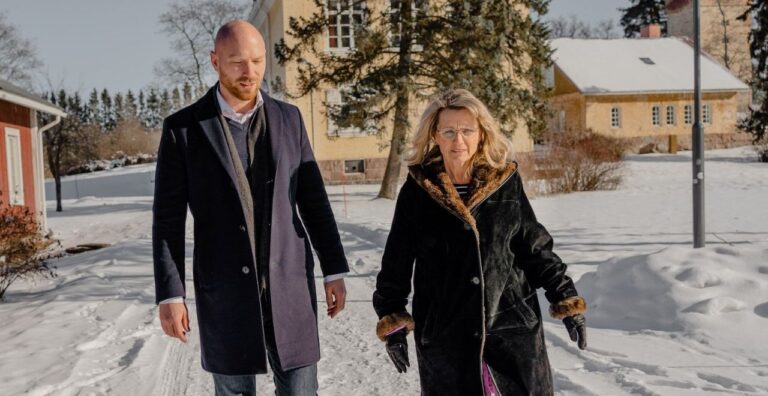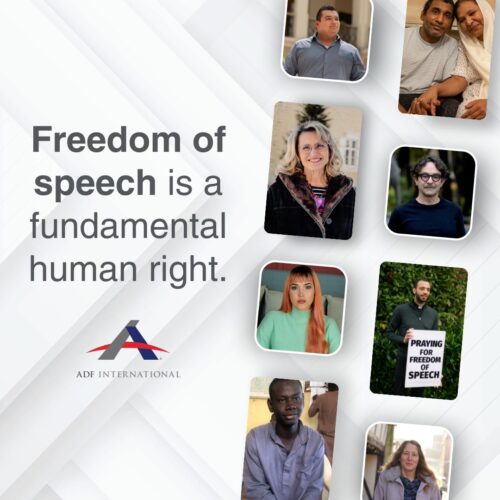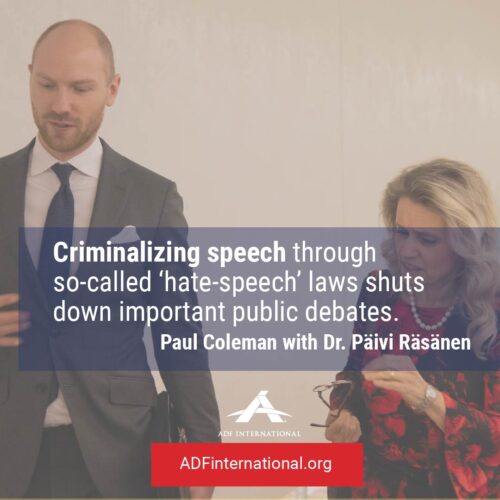Bible-tweet case to be heard at Finnish Supreme Court on 30th October
Long-serving Parliamentarian and grandmother Päivi Räsänen to stand trial a third time for expressing Christian beliefs on marriage and sexuality on “X” (formerly Twitter).
The fight against censorship continues for Päivi Räsänen, Bishop Juhana Pohjola, and everyone around the world.
Former government minister and sitting Finnish parliamentarian Päivi Räsänen will stand trial a third time for her Bible-verse tweet, as confirmed today by the Supreme Court of Finland.
The State prosecutor appealed the case despite the Christian grandmother of 12 being acquitted unanimously of “hate speech” charges before both the Helsinki District Court, and the Court of Appeal. The Supreme Court has agreed to hear that appeal on a date to be set in the future.
Räsänen, who previously served as Finland’s Minister of the Interior, stands criminally charged for sharing her faith-based views on marriage and sexual ethics, in a 2019 tweet, and in a 2004 pamphlet which she wrote for her church, centered on the Biblical text, “male and female he created them”.
The prosecutor has not appealed a third charge based on her appearance on a radio show, making her Court of Appeal acquittal on that charge final. Only the two remaining charges are subject to this latest appeal.
The Finnish Supreme Court has set the date for an oral hearing on 30th October 2025.
Read the update here.
“After my full exoneration in two courts, I’m not afraid of a hearing before the Supreme Court. Even though I am fully aware that every trial carries risks, an acquittal from the Supreme Court would set an even stronger positive precedent for everyone’s right to free speech and religion.”
- Päivi Räsänen, Finnish Parliamentarian and ADF International client
Who is Päivi Räsänen?
Päivi’s life changed forever in June 2019. Finnish police interrogated her for the ‘crime’ of tweeting her biblical worldview. It was this tweet that Päivi, a Finnish medical doctor, active parliamentarian, former Minister of the Interior, mother, grandmother, and Christian posted online to question her church’s official sponsorship of the Helsinki LGBTQ ‘Pride 2019’ event. And for this, she was charged as a criminal.
Nearly four years later, she faced her second trial at the Finnish Court of Appeal in August 2023. This despite receiving a unanimous acquittal at the District Court of Helsinki in March 2022.
Following the 2019 tweet, the police also investigated a pamphlet that she authored for her church in 2004 titled, “As Man and Woman He Created Them” about sexuality and marriage. Bishop Juhana Pohjola also stood trial alongside Päivi for publishing the pamphlet for his congregation.
Since the Prosecutor General levied three criminal ‘hate speech’ charges against Päivi, she has endured a total of 13 hours of interrogation, months of waiting for court procedures, two onerous trials, and countless lies spread by the media.
This committed civil servant and grandmother never thought she would be put on trial for sharing her beliefs in public. But in the face of relentless pressure, she stood strong.
What Were their Charges?
Päivi Räsänen and Bishop Pohjola were prosecuted for the crime of “agitation against a minority group”, under the section of “war crimes and crimes against humanity” in the Finnish criminal code. “Agitation against a minority group” for expressing basic Biblical truth online, in a pamphlet, and on a radio debate. The onerous legal process was the punishment in and of itself because targeting public figures sends an ominous message to all who dare to express their convictions.
In the view of the prosecution, Päivi’s beliefs, rooted in the Bible and Christian tradition, are hateful and criminal. In Finland, and across Europe, the message is becoming increasingly clear: if you hold a different worldview than the state, don’t share it publicly.
This trial showed just how far the prosecution is willing to go to silence and sanction speech that doesn’t conform to their own worldview.


ADF International coordinated the legal defence of Päivi Räsänen and Bishop Pohjola since 2019. After a unanimous acquittal in 2022, free speech was put on trial once again at the Finnish Court of Appeal in August 2023.
In November 2023, the former Finnish Minister who faced three criminal charges for sharing her faith-based beliefs, including on Twitter/X was found not guilty of “hate speech” for Bible Tweet and other expressions.
“While we celebrate this monumental victory, we also remember that it comes after four years of police investigations, criminal indictments, prosecutions, and court hearings. We applaud the Helsinki Court of Appeal’s ruling in this case, and we work towards a bigger victory when such ludicrous cases are no longer brought.
In a free and democratic society, all should be allowed to share their beliefs without fear of censorship. Criminalizing speech through so-called ‘hate-speech’ laws shuts down important public debates and poses a grave threat to our democracies. We are relieved to see courts enforce the rule of law when state authorities overstep by seeking to penalize and censor statements that they dislike,” says Paul Coleman, Executive Director of ADF International Censored: How European Hate Speech Laws are Threatening Freedom of Speech’.
What’s at Stake in this Case?
‘Hate speech’ laws shut down important debates and threaten freedom of speech, which is the cornerstone of democratic society. Everyone has the fundamental right to peacefully share their beliefs without fear or intimidation.
These laws encourage the state to use extraordinary power to police citizens’ speech while opening the door for costly litigation and reputational harm.
Päivi Räsänen and Bishop Pohjola have been acquitted again, this time by the Finnish Court of Appeal, sending a resounding message that censorship is not acceptable in 2023 and beyond. The District Court unanimously upheld the fundamental right to free speech in 2022.
In a unanimous ruling that upheld the District Court’s March 2022 unanimous acquittal, the court dismissed the arguments of the state prosecutor. It found that it “has no reason, on the basis of the evidence received at the main hearing, to assess the case in any respect differently from the District Court. There is therefore no reason to alter the final result of the District Court’s judgment.”
The Court has ordered the prosecution to pay tens of thousands in legal fees to cover costs incurred by both defendants. Almost five years on, the war against censorship continues. Despite
Päivi and Bishop Pohjola both being unanimously acquitted, twice in March 2022 and again in November 2023, now the state prosecutor has appealed their “hate speech” case to the Finnish Supreme Court.
We will support Päivi and Bishop Pohjola for as long as it takes to secure their full acquittal.

Receive updates about Freedom of Speech and our Work
"*" indicates required fields
'Hate Speech' FAQs
What is 'hate speech'?
‘Hate Speech’ is a term with no clear definition. While most will be familiar with the term ‘hate speech’, it is not used by any of the major international human rights treaties, and it has not been clearly defined by the European Court of Human Rights or any other international court.
National governments, technology companies, and international agencies use the term ‘hate speech’ in different ways in different documents. It is widely accepted that there is no universally agreed definition of ‘hate speech’ and most attempts rely on vaguely defined terms and subjectivity. Dangerously Ambiguous Laws Hundreds of draconian criminal speech laws exist on the statute books in Europe. In Austria, ‘insulting or belittling with the intent to violate the human dignity of others carries a two-year prison sentence.
In Greece, ‘insulting God in public’ carries a two-year prison sentence, and in Denmark, insulting the flag of the United Nations carries the same sentence. In Hungary, the State itself can be the victim of ‘hate speech’: inciting hatred against the Hungarian nation potentially carries a three-year prison sentence.
Similar laws exist across Europe, with enforcement focused on those who do not share the State’s views on certain politically charged topics. Consequently, in twenty-first-century Europe, public – and sometimes, even private – discussions on abortion, immigration, Islam, marriage and same sex relationships are high risk.
How are ‘hate speech’ laws a threat to democracy?
‘Hate speech’ laws hurt democracy because ‘hate speech’ laws rely so heavily on subjective and unclear terms (such as ‘insult’, ‘belittle’, and ‘offend.’) They are inconsistently interpreted and arbitrarily enforced. Generally, ‘hate speech’ is considered hateful by reference to the hearer, making it subjective and often with no or little regard for the content of the speech itself.
How do ‘hate speech’ laws threaten freedom of speech within the European Union?
Because of the vague and subjective nature of these allegations, the authorities necessarily have to select which prosecutions to pursue.
This generally results in the targeting of minority groups or opinions by those who disagree. In some cases, even the fact that what was spoken is demonstrably truthful is no defence. It is not just spoken speech which has attracted the attention of censors, but also activity online. Internet giants including Facebook, Twitter, Google and Microsoft have partnered with the European Commission to actively remove ‘hate speech’ online.
In practice, this has led to significant censorship on internet platforms, with very little insight into how each decision to remove user content is made, or how such decisions can be appealed.
Why is freedom of expression so important?
Freedom of expression is undoubtedly one of the most fundamental freedoms and features prominently in all major human rights treaties and national constitutions the world over.
Article 10 of the European Convention on Human Rights guarantees that everyone has the right to freedom of expression, and in the landmark case of Handyside v. United Kingdom, 6 the European Court of Human Rights recognized that: Freedom of expression constitutes one of the essential foundations of [democratic] society, one of the basic conditions for its progress and for the development of every man … it is applicable not only to ‘information’ or ‘ideas’ that are favourably received or regarded as inoffensive or as a matter of indifference, but also to those that offend, shock or disturb the State or any sector of the population.
Such are the demands of that pluralism, tolerance and broadmindedness without which there is no ‘democratic society’. The European Court has further stressed that States are under a positive obligation to create a favourable environment for participation in public debate by all persons concerned, enabling them to express their opinions and ideas without fear. speak freely.
What are the consequences of being charged with hate speech?
‘Hate speech’ laws shrink the boundaries of free speech and create a chilling effect on a variety of important conversations. Given the vague nature of ‘hate speech’, citizens look to avoid engaging in sensitive or potentially offensive topics for fear that this might be qualified as ‘hate speech’ and lead to a criminal investigation.
These ‘hate speech’ laws can ruin the reputation and livelihoods of individuals, even when they ultimately do not result in a prosecution. In this sense, the process becomes the punishment and others are deterred from making similar statements in the future.








Europe’s Free Speech Crisis Is Making International Headlines